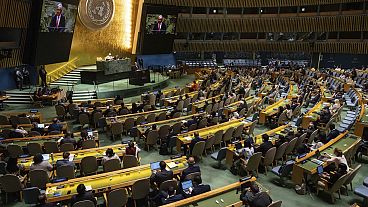Residents in one of the most popular parts of Hungary's capital, Budapest, have joined other European cities in voting to call time on short-term rentals.
In an unprecedented move, a single district of Budapest has taken the decision to ban Airbnb-style short-term rentals.
Residents from the district of ‘Terézváros’ (Theresa city) were offered the chance to vote on the issue earlier this month and more than 6,000 people took part in the vote, coming out in favour of the ban.
Although turnout was low at 20.52%, the vote in favour of the ban was 54%, meaning the no-go rule will start from 1 January 2026.
Overtourism is largely to blame
An increasing number of European cities' residents are struggling with "over-tourism" in their neighbourhoods.
At certain popular and often-visited destinations, the huge amount of tourists, although economically welcome for bringing in income, is often considered to be a damage to the city itself.
Critics argue too many visitors harm or degrade historic sites, they overwhelm infrastructure and make it increasingly difficult for locals to find housing. Airbnb-style apartments are seen as pushing up property prices and rents.
According to Eurostat, some 719m nights across the EU were booked via online platforms Airbnb, Booking, Expedia Group and Tripadvisor last year. It shows an increase of 20% compared to the previous year.
Within central Europe, Budapest was the most popular for short-term stays with 6.7m guest nights.
The sixth district in Budapest is one of the most centre areas, from where tourists can easily walk to the Parliament, the Chain Bridge and the Castle, three of the most important historic and tourist locations in the capital.
Is phasing out short-term rentals going to be a solution?
The vote was announced as "an interesting democratic experiment" following a high level of complaints from residents about apartments rented out to tourists, and the increase in short-term rental of apartments, seen as partly responsible for the increase in property prices and rents in the district.
According to a leading property website, ingatlan.com, house prices tripled since 2015 in Budapest, and compared to last year, prices were 7.8% higher in August. As for the sixth district, the average price per square meter of premium quality properties is around HUF 1.43m (3630€).
After the vote was concluded, Mayor Tamás Soproni from the centrist political party Momentum Movement said: "The next step is to bring the will of the people of Terezváros to the representative body, and we will create a decree on their decision."
There is now an increased concern that the ban may spread within Budapest, with opponents saying municipalities would lose significant income and local businesses would suffer. Head of the vote, the local authority did accept that the short-term rentals did bring in taxes to the area and create jobs, many of which might be lost.
"I consider it important that the change will only come into effect on 1 January 2026, so businesses will have time to prepare for the change," said Soproni in his statement on the district's website.















